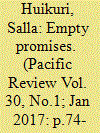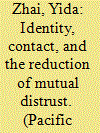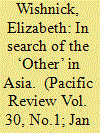|
|
|
Sort Order |
|
|
|
Items / Page
|
|
|
|
|
|
|
| Srl | Item |
| 1 |
ID:
151438


|
|
|
|
|
| Summary/Abstract |
Southeast Asia is one of the most underrepresented regions in the International Criminal Court (ICC). I address the question of non-ratification of the Rome Statute with a case study on Indonesia. While the Yudhoyono Administration has repeatedly promised to join the ICC, ratification has not materialized. I argue that Indonesia's tradition of emphasizing the protection of state sovereignty and economic gains in its foreign policy decisions best explains why it remains outside the ICC's jurisdiction. I test this claim by exploring Indonesia's human rights record, potential legal restrictions for the ratification of the Rome Statute, and the influence of domestic political players and external pressures.
|
|
|
|
|
|
|
|
|
|
|
|
|
|
|
|
| 2 |
ID:
151437


|
|
|
|
|
| Summary/Abstract |
Since the coming to power of Kim Jong Un in 2012, the North Korean government has recently announced, and to some degree has implemented, a new set of economic management policies known as the June 28th measures in 2012 and the May 30th measures in 2014. Both of these sets of measures seek to build upon the abandoned reforms of the early 2000s through restructuring North Korea's highly inefficient collective farm and state-owned enterprise management system. In addition, the government has intensified ongoing efforts at building special economic zones for the purpose of attracting foreign investment. As such, the country is attempting to emulate the reforms adopted by China in the late 1970s. Although the success of these efforts is by no means guaranteed, they do serve to question mainstream analyses that suggest that Juche Self-Reliance or Sŏn'gun Military First Politics ideologies will inhibit any genuine attempt at economic reform in North Korea. We argue, in contrast, that ongoing changes to North Korean state and society mean that, a cyclical stop and start rhythm to the reforms notwithstanding, such attempts at economic reform are likely to continue. However, we also argue that while the contemporary reform drive resembles and may indeed reproduce some of the successes of the Chinese experience, North Korea faces significantly greater challenges, including the greater decline of North Korean industry, local resistance to reform, and the dangers of inflation. Furthermore, North Korea faces a highly challenging external security environment that undermines the ability of the regime to attract investment and by extension the political standing of reformist elements within the country. Given this contrast with the international environment surrounding China's own reform experience, our analysis emphasises the importance of geopolitical context in shaping experiences of economic reform and of development more broadly.
|
|
|
|
|
|
|
|
|
|
|
|
|
|
|
|
| 3 |
ID:
151439


|
|
|
|
|
| Summary/Abstract |
In the midst of rising tension between China and Japan, two powerful countries in Asia, the favorable attitudes of each country's citizens toward the other country have dropped to a historical low. The Taiwan issue, historical legacy, island disputes, and maritime resource competition are major obstacles in Sino-Japanese relations, but the most fundamental issue is a deep-seated mutual distrust and suspicion between the two countries, which result in rising threat perceptions. Beyond the structural and political elite-centered approaches, this study examines the evidence related to the three approaches (face-to-face contact, cross-cultural exposure, and social identity) to reduce mutual distrust and antipathy in the two countries. With a careful analysis of the survey data, this study sheds light on the conditions under which contact (a) results in improved attitudes toward outgroup, (b) has little or no effect on intergroup relations, and (c) yields more prejudice and hostility toward the outgroup. The findings of this study not only identify factors that could facilitate mutual understanding between Chinese and Japanese people and more favorable impressions of one another, but are also relevant to planning interventions to reduce prejudice and distrust among people from different races, religions, and countries.
|
|
|
|
|
|
|
|
|
|
|
|
|
|
|
|
| 4 |
ID:
151440


|
|
|
|
|
| Summary/Abstract |
This paper argues that Russia and China are partners of consequence and that the neglect of the normative dimension of the Sino-Russian relationship has led its impact on global governance to be undervalued and misunderstood. Following a constructivist approach, the paper examines the shared norms underlying an ever closer Sino-Russian partnership, despite divergent interests in a number of areas. A first section examines how shared norms lead Russia and China to define their identity similarly, facilitate joint actions, and constrain their individual policy choices. For Russia, elaborating its own unique identity is crucial to its claim to global status, though complicated by interactions with multiple ‘Others.’ Russia's effort to engage Asian partners is often viewed as hedging against China, but as second section argues that Russian engagement in Asia is better understood in terms of Russia's effort to define an Asian identity. A third section highlights the securitization/desecuritization dynamic in Sino-Russian economic relations. Xi Jinping's efforts to redefine China's global role reinforces its tendency to desecuritize the vulnerabilities that lead China to seek economic cooperation with Russia. Russia, fearing becoming a ‘resource appendage’ of China, then securitizes economic relations with China.
|
|
|
|
|
|
|
|
|
|
|
|
|
|
|
|
| 5 |
ID:
151436


|
|
|
|
|
| Summary/Abstract |
Recent commentary on India–Australia relations has defined the relationship as ‘natural’ and based on ‘shared values’ and ‘shared history’. The relationship has simultaneously been considered ‘neglected’. The paradoxical juxtaposition of a natural/neglected partnership is yet to be adequately explained. We consider the historical construction of liberalism in both states as a facet of state identity to argue that, far from creating a natural relationship, differing liberal identities have served to keep these two states apart. This is illustrated through case studies of divergent opinions over the Nuclear Non-Proliferation Treaty, Russia's 2014 annexation of Crimea and the rise of China.
|
|
|
|
|
|
|
|
|
|
|
|
|
|
|
|
| 6 |
ID:
151435


|
|
|
|
|
| Summary/Abstract |
Two analytical perspectives – conventional wisdom derived from warlordism and European colonialism, and soft-power concepts drawn from post-Cold-War American international relations – are prevalent lenses for analysing China's global rise. However, neither considers the role of the past in shaping China's contemporary diplomacy. This paper fills the gap of this under-researched area by providing an alternative perspective featuring analytic categories rooted in China's tributary tradition. It proposes a neo-tributary framework for systematically interpreting historical Chinese mentalities and strategies embedded in China's contemporary power strategy.
|
|
|
|
|
|
|
|
|
|
|
|
|
|
|
|
|
|
|
|
|